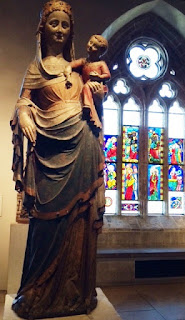It is especially when we find age, life-altering illness or death upon us that we begin to think about what has remained constant throughout the vicissitudes of our life - what, in other words, has offered the persistent direction to a “north” for the compass of our souls. For each of us, in the course of our lives, there are certain critical truths and experiences that have seized and shaped us. Looking at the unswerving conviction in the lives of people we admire may help us reach that place of constancy in our own hearts.
Jesus himself, exhausted from his temptations in Gethsemani and unable to feel the presence and support of God on the cross, says “My God, my God, why have you forsaken me?” But he never completely lost the fundamental reassurance of his relationship with his Father.
Mother Theresa, who also experienced profound inner darkness and feelings of abandonment by God while serving the poorest of the poor, had to have a “fixed song” that kept her motivated, even though she often could not hear it. Perhaps it was her rock-bottom conviction that it is Christ himself she was caring for in the abandoned and dying strangers whom she picked up in the streets. In spite of the darkness, she knew “a place of constancy” in her heart.
For many ordinary Christians, the truth that lies at the heart of their lives, tempered and polished over the decades, may be their rich understanding of the Incarnation, of God’s self-portrait in the person of Jesus. It is because of their sacramental vision that they are forever picking up clues about their Creator’s beauty hidden in the ordinariness of things. Knowing how to look, everything they see is touched by wonder. St. Augustine assures us that the experience of life is the experience of the divine. He once wrote: “Make humanity your goal, and you will find your way to God.” In other words, there is an inner light that radiates from everything, the mystery of the presence of God in our world.
Having said all this, there are, however, moments when our spirit seems to completely “stall.” The fixed song, the enduring melody of meaning that has been a lifeline to us, really does go silent. But that doesn’t mean that the “fixed song,” once silenced, can’t be heard again. Terrible though this is, it is not a reason to lose hope, for it is sometimes only in absence that we discover presence; only in real darkness that light perceptibly shines. Pushed to “hopelessness” we sometimes begin to hope for the first time.
Photograph by Brother Brian. Meditation by Father Dominic.
Jesus himself, exhausted from his temptations in Gethsemani and unable to feel the presence and support of God on the cross, says “My God, my God, why have you forsaken me?” But he never completely lost the fundamental reassurance of his relationship with his Father.
Mother Theresa, who also experienced profound inner darkness and feelings of abandonment by God while serving the poorest of the poor, had to have a “fixed song” that kept her motivated, even though she often could not hear it. Perhaps it was her rock-bottom conviction that it is Christ himself she was caring for in the abandoned and dying strangers whom she picked up in the streets. In spite of the darkness, she knew “a place of constancy” in her heart.
For many ordinary Christians, the truth that lies at the heart of their lives, tempered and polished over the decades, may be their rich understanding of the Incarnation, of God’s self-portrait in the person of Jesus. It is because of their sacramental vision that they are forever picking up clues about their Creator’s beauty hidden in the ordinariness of things. Knowing how to look, everything they see is touched by wonder. St. Augustine assures us that the experience of life is the experience of the divine. He once wrote: “Make humanity your goal, and you will find your way to God.” In other words, there is an inner light that radiates from everything, the mystery of the presence of God in our world.
Having said all this, there are, however, moments when our spirit seems to completely “stall.” The fixed song, the enduring melody of meaning that has been a lifeline to us, really does go silent. But that doesn’t mean that the “fixed song,” once silenced, can’t be heard again. Terrible though this is, it is not a reason to lose hope, for it is sometimes only in absence that we discover presence; only in real darkness that light perceptibly shines. Pushed to “hopelessness” we sometimes begin to hope for the first time.
Photograph by Brother Brian. Meditation by Father Dominic.








 “I have witnessed the
affliction of my people, so I know well what they are suffering. Therefore I
have come down to rescue them.”
“I have witnessed the
affliction of my people, so I know well what they are suffering. Therefore I
have come down to rescue them.” 


